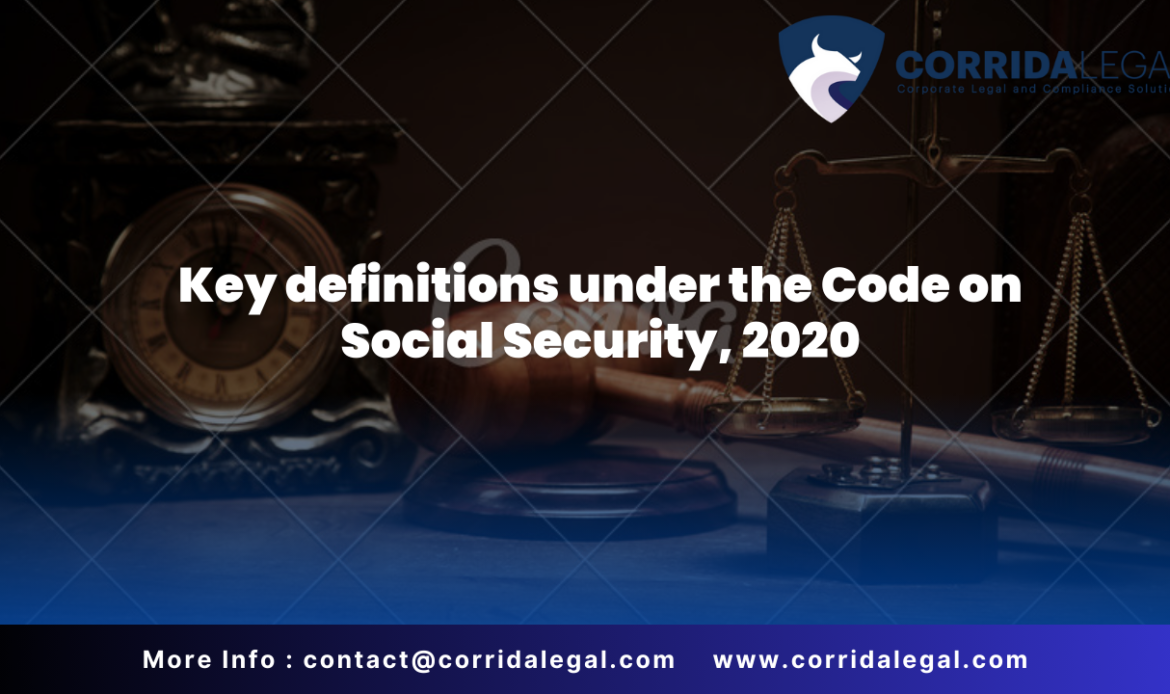The Code on Social Security, 2020 is an important piece of legislation aimed at amending and consolidating the laws relating to social security to extend social security to all employees and workers, whether in the organized unorganized, or any other sectors and for matters connected therewith or incidental thereto. Our article titled, ‘Key definitions under the Code on Social Security, 2020’ lists out the revised definition and conceptual understanding of gig workers, platform workers, wages, etc.
Gig Worker Vs. Platform Worker under the Code on Social Security, 2020
A new category of worker has been included in this code:-
- Gig Worker: A gig worker” means a person who performs work or participates in a work arrangement and earns from such activities outside of the traditional employer-employee relationship. Gig workers are in independent arrangements, freelancers, and workers who are employed on project-based work and short-term work. Most commonly, platform-based work where workers earn money by providing specific services, including food delivery services.
- Platform Worker: “Platform worker” means a person engaged in or undertaking platform work.
- Platform work” means a form of employment in which organizations or individuals use an online platform to access other organizations or individuals to solve specific problems or to provide specific services in exchange for payment.
There is no major difference between gig workers and platform workers. This is the first time in India that application-based assignments performed by many workers are recognized as an employee-employer relationship.
The definition of wages
As per the Code on Social Security, 2020, “wages” means all remuneration, whether by way of salaries, allowances, or otherwise, expressed in terms of money or capable of being so expressed which would, if the terms of employment, express or implied, were fulfilled, be payable to a person employed in respect of his employment or of work done in such employment, and includes:
- Basic pay
- Dearness allowance
- Retaining allowance (if any)
but does not include—
- Any bonus payable under any law for the time being in force, which does not form part of the remuneration payable under the terms of employment;
- The value of any house accommodation, or the supply of light, water, medical attendance, or other amenities, or of any service excluded from the computation of wages by a general or special order of the appropriate Government;
- Any contribution paid by the employer to any pension or provident fund, and the interest which may have accrued thereon;
- Any conveyance allowance or the value of any traveling concession;
- Any sum paid to the employed person to defray special expenses entailed on him by the nature of his employment;
- House rent allowance;
- Remuneration payable under any award or settlement between the parties or order of a court or Tribunal;
- Any overtime allowance;
- Any commission payable to the employee;
- Any gratuity payable on the termination of employment;
- Any retrenchment compensation or other retirement benefit payable to the employee or any ex gratia payment made to him on the termination of employment, under any law for the time being in force.
- The First part now includes all salary components expressed in terms of money or capable of being so expressed like basic salary, all reimbursements, all allowances, and all benefits.
- The second part of the definition provides specific exclusions like:- bonuses payable under any law, conveyance allowance, house rent allowance, overtime allowance, house accommodation, supply of light, water, medical attendance, other amenities/services excluded by a general or special order of the appropriate government, commission, contribution to provident fund/pension, any sum paid to defray special expenses, gratuity, retrenchment compensation, remuneration payable under any award or settlement between the parties.
- The Third part of the definition provides that the total excluded components should not exceed 50% of the total remuneration. The definition very clearly specifies the list of exclusions, so anything that is paid to the employees other than the exclusion would be covered within this specific exclusion the limit cannot be more than 50%.
Impact: As of now HRA is a part of minimum wages and with the implementation of the code HRA will not be part of minimum wages, which will imply the EPF contribution.
Corrida Legal is equipping companies with processes for ensuring due compliance through audits and implementation and this article provides the precise set of revised definitions under the Code on Social Security, 2020.
About Us:
Corrida Legal is a boutique corporate & employment law firm serving as a strategic partner to businesses by helping them navigate transactions, fundraising-investor readiness, operational contracts, workforce management, data privacy, and disputes. The firm provides specialized and end-to-end corporate & employment law solutions, thereby eliminating the need for multiple law firm engagements. We are actively working on transactional drafting & advisory, operational & employment-related contracts, POSH, HR & data privacy-related compliances and audits, India-entry strategy & incorporation, statutory and labour law-related licenses, and registrations, and we defend our clients before all Indian courts to ensure seamless operations.
We keep our client’s future-ready by ensuring compliance with the upcoming Indian Labour codes on Wages, Industrial Relations, Social Security, Occupational Safety, Health, and Working Conditions – and the Digital Personal Data Protection Act, 2023. With offices across India including Gurgaon, Mumbai, and Delhi coupled with global partnerships with international law firms in Dubai, Singapore, the United Kingdom, and the USA, we are the preferred law firm for India entry and international business setups. Reach out to us on LinkedIn or contact us at contact@corridalegal.com/+91-9211410147 in case you require any legal assistance. Visit our publications page for detailed articles on contemporary legal issues and updates.


